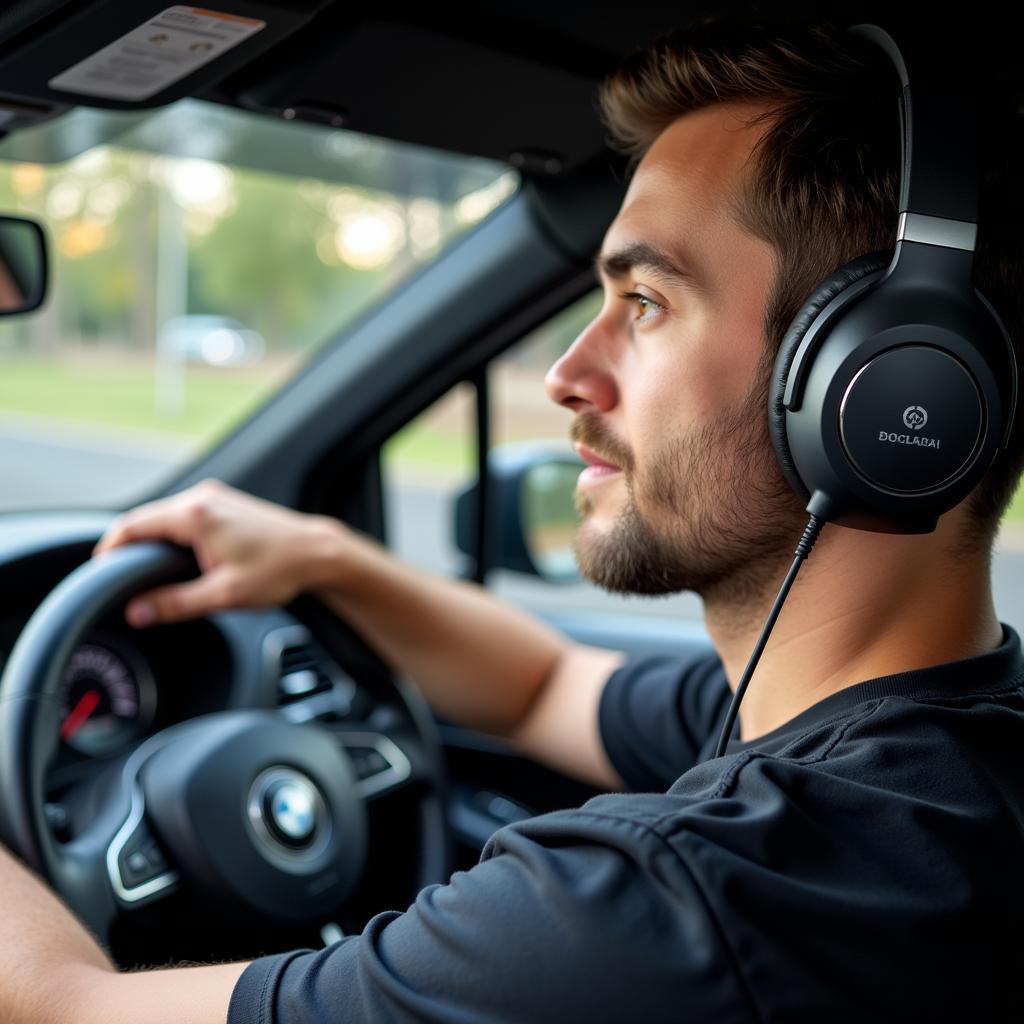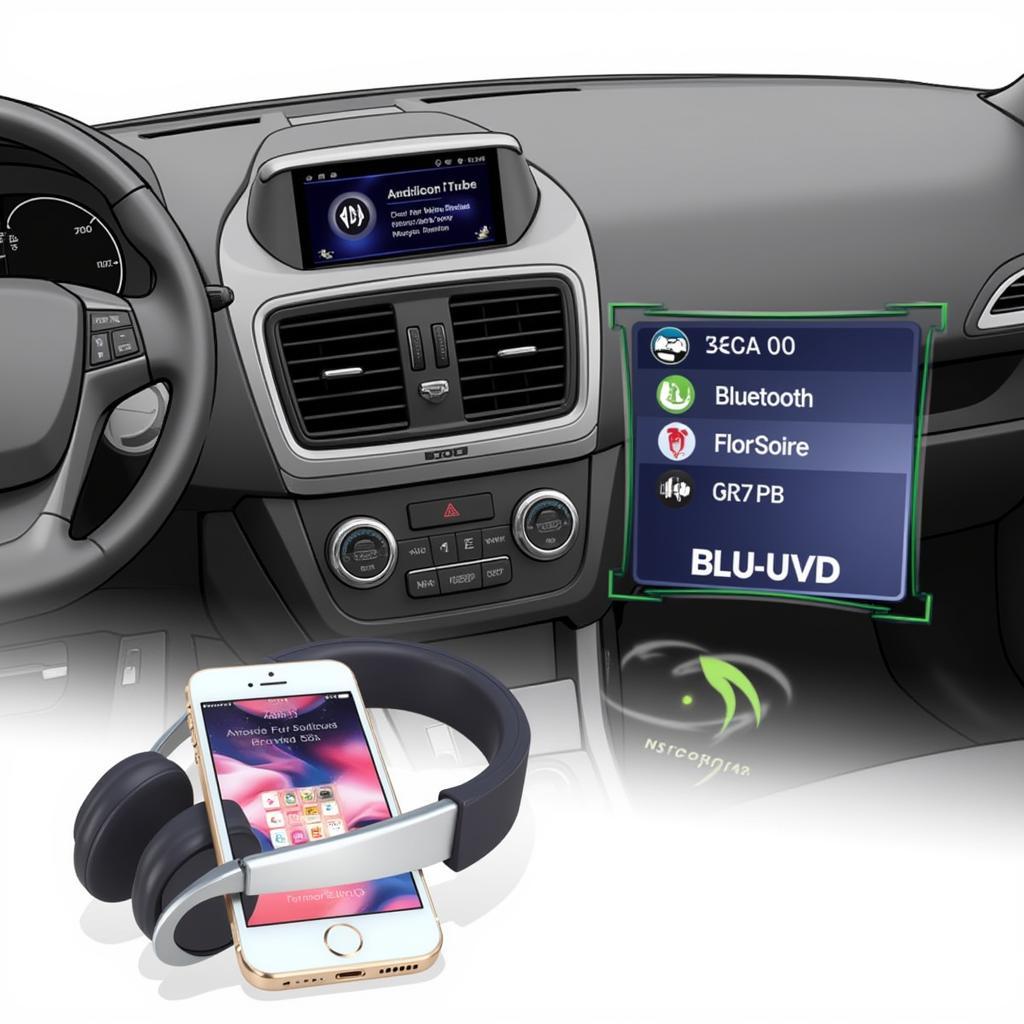Best Headphones for Car: The Ultimate Guide to Crystal-Clear Audio on the Road
October 21, 2024Whether you’re on a cross-country road trip or just battling rush hour traffic, having a great pair of headphones can transform your car time. But with so many options on the market, finding the perfect headphones for your car can feel overwhelming. This guide will break down everything you need to know to make the right choice, from noise cancellation technology to comfort and style.
 Noise-canceling headphones for car use
Noise-canceling headphones for car use
Why Invest in Headphones Specifically for Car Use?
You might be wondering, “Can’t I just use my regular headphones in the car?” While technically yes, headphones designed with car use in mind offer distinct advantages:
- Superior Noise Cancellation: Cars generate a lot of ambient noise – engine hum, road noise, other passengers. Headphones with strong active noise cancellation (ANC) can significantly reduce these distractions, allowing you to enjoy your music or podcasts without needing to crank up the volume to ear-splitting levels.
- Comfort for Extended Wear: Long drives mean your headphones need to be comfortable for hours on end. Look for features like plush earcups, adjustable headbands, and lightweight designs to prevent discomfort and fatigue.
- Seamless Connectivity: Many car-specific headphones prioritize Bluetooth connectivity with a strong and stable signal range, ensuring uninterrupted audio even on bumpy roads.
Types of Headphones Ideal for Car Use
1. Over-Ear Headphones: Immersive Sound and Comfort
Over-ear headphones are a popular choice for car use because they offer excellent noise isolation and typically provide the best sound quality. The earcups completely enclose your ears, creating a seal that blocks out external noise.
Pros:
- Superior Noise Isolation: Naturally block out more ambient noise, even without ANC.
- Exceptional Sound Quality: Larger drivers deliver a wider soundstage and richer bass response.
- Comfortable for Long Drives: Evenly distribute pressure around the ears.
Cons:
- Can Get Warm: The earcup design may lead to sweaty ears, especially in warmer climates.
- Less Portable: Bulkier than other styles, making them less convenient to carry around.
2. In-Ear Headphones: Portability and Discreet Listening
In-ear headphones, also known as earbuds, offer a more portable and discreet listening experience. They fit snugly inside your ear canal, providing passive noise isolation.
Pros:
- Ultra-Portable: Easily slip into your pocket or bag.
- Discreet Design: Less noticeable than over-ear headphones.
- Affordable Options Available: A wide range of in-ear headphones are available at various price points.
Cons:
- Less Effective Noise Isolation: May not block out all external noise, especially in noisy car environments.
- Sound Leakage: Can leak sound at higher volumes, potentially disturbing other passengers.
- Comfort Can Vary: Fit is crucial, and some people find in-ear headphones uncomfortable for extended wear.
3. Bone Conduction Headphones: Situational Awareness for Safety
Bone conduction headphones transmit sound through vibrations in your cheekbones, leaving your ears open to hear surrounding sounds. While not ideal for immersive listening, they are a good option for drivers who need to maintain situational awareness.
Pros:
- Situational Awareness: Allow you to hear traffic, horns, and emergency vehicle sirens.
- Comfortable for Some: Don’t press on your ears, making them comfortable for some users.
Cons:
- Subpar Sound Quality: Can’t match the audio fidelity of traditional headphones.
- Not Ideal for Noisy Environments: Limited noise isolation makes them less suitable for loud car cabins.
Factors to Consider When Choosing Headphones for Car Use
1. Noise Cancellation: Active vs. Passive
- Active Noise Cancellation (ANC): Uses microphones and sound processing to cancel out ambient noise electronically. ANC headphones are highly effective at reducing low-frequency sounds like engine hum and road noise.
- Passive Noise Isolation: Relies on the physical design of the headphones, like the earcup seal in over-ear models or the snug fit of in-ear models, to block out sound.
2. Sound Quality: Drivers and Frequency Response
- Drivers: The larger the headphone drivers, the more powerful the sound output and bass response.
- Frequency Response: Look for headphones with a wide frequency range (e.g., 20Hz-20kHz) for balanced audio across all frequencies.
3. Comfort and Fit: Crucial for Long Drives
- Earcups/Eartips: Choose headphones with soft, breathable earcups (over-ear) or multiple ear tip sizes (in-ear) for a comfortable fit.
- Headband: An adjustable headband ensures a secure and comfortable fit, especially important for long drives.
- Weight: Lighter headphones are generally more comfortable for extended wear.
4. Battery Life: Essential for Road Trips
- Wireless Headphones: Check the battery life specifications and opt for headphones with at least 8-10 hours of playtime on a single charge.
- Wired Headphones: Don’t require batteries, but you’ll need to use an auxiliary cable to connect to your car’s audio system.
5. Connectivity: Bluetooth for Wireless Freedom
- Bluetooth Version: Choose headphones with the latest Bluetooth version (5.0 or higher) for a more stable connection and better energy efficiency.
- Range: A strong Bluetooth range ensures uninterrupted audio, even if your phone is in your pocket or bag.
 Bluetooth headphones seamlessly connecting to a car's infotainment system
Bluetooth headphones seamlessly connecting to a car's infotainment system
Tips for Using Headphones Safely in the Car
- Keep the Volume at a Safe Level: Prolonged exposure to loud music can damage your hearing. Follow the 60/60 rule: Listen at 60% volume for no more than 60 minutes at a time.
- Be Aware of Your Surroundings: If you’re using noise-canceling headphones, be mindful of your surroundings, especially when driving in traffic or near pedestrians.
- Check Local Laws and Regulations: Some areas may have restrictions on headphone use while driving.
Conclusion
Investing in a quality pair of headphones can significantly enhance your in-car listening experience. By carefully considering factors like noise cancellation, sound quality, comfort, and connectivity, you can find the perfect headphones to make every drive more enjoyable.
FAQs
1. Do I need noise-canceling headphones for my car?
Noise-canceling headphones are highly recommended for car use as they effectively reduce engine and road noise, allowing you to enjoy your audio at lower, safer volumes.
2. What’s the best way to connect headphones to my car’s audio system?
Most modern cars offer Bluetooth connectivity for seamless wireless audio streaming. Alternatively, you can use an auxiliary cable to connect your headphones directly to the car’s audio jack.
3. Can I use bone conduction headphones for phone calls in the car?
Yes, bone conduction headphones usually have built-in microphones for taking calls. However, they may not offer the same level of call clarity as traditional headphones, especially in noisy car environments.
4. Are there any safety concerns with wearing headphones while driving?
While not illegal in most places, it’s essential to prioritize safety and be mindful of your surroundings when using headphones while driving. Keep the volume at a safe level and avoid using noise-canceling headphones in situations where you need to be fully aware of your environment.
5. How often should I charge my wireless Headphones For Car use?
The frequency of charging depends on the headphones’ battery life and your usage habits. It’s generally a good idea to charge your headphones fully after each use or whenever the battery level gets low.
Need more guidance on finding the right headphones for your next adventure? Check out our other helpful resources:
- dirt racing gifts
- marshall origin 20 vs 50
- walkout songs for football
- gaming ghar
- what to pack for a conference
For personalized recommendations and expert advice, don’t hesitate to contact our team:
Phone: 0915117113
Email: [email protected]
Address: Tổ 3 Kp Bình An, Phú Thương, Việt Nam, Bình Phước 830000, Việt Nam
We’re here to help you find the perfect audio gear for any situation!